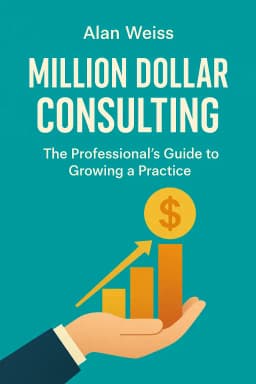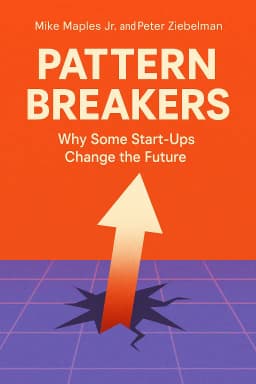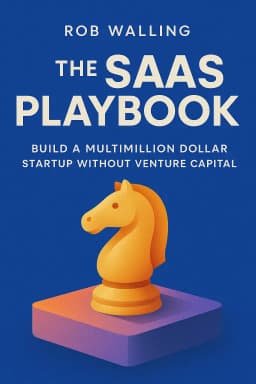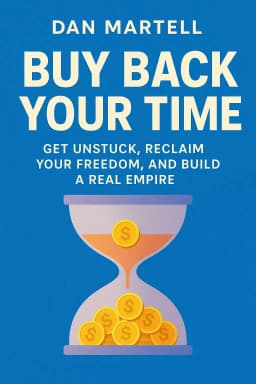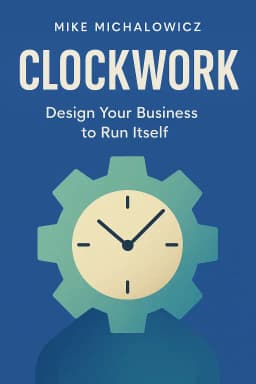
The Productivity Lie
Design Your Business to Run Itself
Golden Hook & Introduction
SECTION
Mark: Alright, Michelle, I'm going to say something that might sound like heresy to every entrepreneur, every ambitious person listening right now: Productivity is a trap. In fact, the harder you work and the more 'productive' you become, the more likely you are to destroy your business and your life. Michelle: Hold on, that sounds completely backward. Are you telling me the secret to success is to be less productive? That sounds like a recipe for disaster, Mark. Every business guru out there is selling a new productivity hack. Mark: Exactly! And that's the lie we've all been sold. This is the core, radical idea behind the book we’re diving into today, Clockwork: Design Your Business to Run Itself by Mike Michalowicz. And what's fascinating about Michalowicz is that he's not some academic in an ivory tower. This is a guy who built and sold multi-million dollar companies, but also lost his fortune twice. He wrote this book from a place of deep personal failure, on a mission to eradicate what he calls 'entrepreneurial poverty'—not just of money, but of time and soul. Michelle: Wow, okay. So this comes from real-world scars, not just theory. That definitely gets my attention. If productivity is the problem, then what's the real issue here? Why do so many passionate, hard-working business owners end up completely burned out? Mark: That is the perfect question, and it leads to one of the most chilling stories I've ever read in a business book. It’s the story of a woman named Celeste.
The 'Productivity is Shit' Revelation: Escaping the Survival Trap
SECTION
Michelle: Celeste. Okay, I'm listening. Mark: Celeste owned a preschool. It was her dream. But she sent an email to the author, Mike, at two in the morning. In it, she confessed that the business was failing. She hadn't taken a salary since it started, she was racking up debt, and at that very moment, she was on her hands and knees scrubbing the preschool floors while suffering from double pneumonia. Michelle: Oh, my god. That's just brutal. Mark: It gets worse. She wrote, "I am broken. Not just financially, but in my soul." She even admitted she'd contemplated ending her life, but couldn't bear the thought of the burden it would put on her family. And the email ends with this haunting, six-word question: "What has become of my dream?" Michelle: That's absolutely devastating. It’s the dark side of entrepreneurship that nobody wants to put on Instagram. Did the author ever hear from her again? Mark: He tried. He emailed her back multiple times, tried to find her, but he never got a response. Her story became this ghost in the machine for him, a symbol of what happens when the dream becomes a nightmare. And this is what he calls the "Survival Trap." Michelle: The Survival Trap. That sounds horribly accurate. It’s that feeling of just trying to make it through the day, putting out one fire after another, with no time to think or plan. Mark: Precisely. It's a state of constant reaction. You're so busy 'doing'—scrubbing the floors, answering every email, handling every client issue—that you have no time for the important, visionary work that actually grows the business. And this is where the productivity myth comes in. We think if we can just get more done, faster, we'll escape the trap. Michelle: Right, if I can just answer 100 emails an hour instead of 50, I'll finally get ahead. Mark: But it doesn't work. Michalowicz tells his own story of being a "Vacation Workaholic." He'd build these successful companies, take his family on vacation, and promise his wife he'd unplug. But he couldn't. He'd be on the beach, laptop out, fielding calls, solving problems. He was more productive than ever, but he was a prisoner. His family was miserable, and he was miserable. Michelle: I think a lot of people would see that as a badge of honor, though. The founder who never stops working, who's always on. It's a weird part of our culture. Mark: It is. Until he met a former productivity expert named Chris Winfield, who told him something that changed his entire perspective. Winfield looked him in the eye and said, "Productivity is shit." Michelle: (laughs) Okay, I love the bluntness. But what did he mean by that? Mark: He meant that teaching people to be more productive only resulted in them doing more work. It doesn't actually solve the underlying problem. It just helps you run faster on the hamster wheel. You're still on the wheel. You're just an exhausted, highly-efficient hamster. The goal isn't to get more done. The goal is to design a company that gets the right things done, with or without you. Michelle: Okay, I'm convinced. The 'hustle harder' model is broken. It leads to burnout, misery, and in Celeste's tragic case, utter despair. So what's the alternative? How do you actually build this 'Clockwork' business that runs itself? Mark: This is where the genius of the book really shines. It's not about a new to-do list app or a time management trick. It's about redesigning the machine itself. And it all starts with identifying one single, critical thing: The Queen Bee Role.
The Clockwork Engine: The QBR and the 4D Mix
SECTION
Michelle: The Queen Bee Role. Okay, 'QBR' sounds cool, but what does that actually mean for a regular business? Like a coffee shop or a software company? Mark: It's a brilliant analogy. In a beehive, every single bee has two jobs. The first, and most important, is to protect the queen. Because if the queen dies, the whole colony collapses. Only after ensuring the queen is safe and served do they go do their other job, like collecting pollen. The QBR is the 'queen' of your business. It's the single most critical function that, if it fails, your entire business will eventually die. Michelle: So it's not a person? It's a function? Mark: Exactly. It's a role, not a person. And this is where it gets incredibly powerful. Michalowicz illustrates this with another stark, real-world story. Two ER visits, two completely different outcomes. Michelle: Okay, lay it on me. Mark: On the same day, a seven-year-old boy named Dorian gets a metal shard in his eye and goes to a small hospital on Cape Cod. At the same time, a 49-year-old woman named Esmin Green, suffering a psychotic episode, is brought to a massive hospital in Brooklyn. The QBR of any emergency room is simple: diagnose and treat patients. Michelle: Right, that's its core purpose. Mark: At the Cape Cod hospital, the system was designed to protect that QBR. Dorian was seen, the shard was removed, and he was back at his vacation home within an hour. The system worked like clockwork. At the Brooklyn hospital, the system was broken. Esmin Green was left in the waiting room. She sat there, unattended, for 24 hours. Michelle: Twenty-four hours? That's... I have no words. Mark: She died in her chair from a blood clot caused by sitting for so long. The system failed to protect its most basic function—its QBR—and the result was fatal. The business of the hospital failed. Michelle: That is a horrifyingly effective way to make a point. It makes 'business efficiency' feel like a life-or-death issue. So, can you give me a positive example? A business that protects its Queen Bee and thrives because of it? Mark: Absolutely. Let's go to Savannah, Georgia, to a place called Mrs. Wilkes' Dining Room. It's a legendary Southern food restaurant. It's only open for three hours a day, Monday to Friday, and there is always a line down the block. Michelle: What's their secret? Mark: Their QBR is "remarkably delicious food." That's it. And the entire business is a system designed to protect that role. The founder's granddaughter, who runs it now, maintains relationships with local farmers for the freshest ingredients. The chef and kitchen staff's primary job is to serve that QBR. But here's the key: the servers' job isn't just to serve food. Their first job is to protect the QBR. They ensure the food is ready the moment the doors open, they rotate dishes to keep everything fresh, they even help with prep work if the kitchen gets behind. Michelle: So it's not about one person being a hero, like a star chef. It's about the entire system being designed to serve that one single, critical function. The deliciousness of the food. Mark: You've got it. The whole team understands that nothing else matters if the food isn't remarkable. And that's the Clockwork engine. And the way you build this engine is by analyzing your time through what Michalowicz calls the 4D Mix. Michelle: The 4Ds? Mark: Doing, Deciding, Delegating, and Designing. Most entrepreneurs are trapped in 'Doing' (the hands-on work) and 'Deciding' (being the bottleneck for every choice). The goal of Clockwork is to systematically move your time out of those two and into 'Delegating' (empowering your team) and, most importantly, 'Designing' (working on the business, not just in it). You design the systems that protect the QBR. Michelle: So you're not just a worker bee anymore. You become the architect of the hive. Mark: That's the perfect way to put it. You stop being the busiest bee and start being the one who ensures the queen is always protected. When you do that, the business doesn't just survive; it thrives, often in ways you never imagined. There's a story of a construction company owner who implemented this, moved to Italy for two years, and came back to find his business had doubled in revenue without him. Michelle: That's the dream, isn't it? Not just freedom from work, but the business actually getting better because you stepped away and let the system you designed do its job. Mark: That's the promise of Clockwork. It's not about working less, necessarily. It's about doing the right work. The work of a designer, not just a doer.
Synthesis & Takeaways
SECTION
Michelle: It’s all starting to connect for me now. The Survival Trap that Celeste was in, that feeling of drowning in 'Doing' work, is the direct result of not having a clearly defined and protected Queen Bee Role. Mark: Exactly. The Survival Trap is what happens when you're stuck 'Doing' and 'Deciding' on a thousand different things, because you think everything is equally important. The only way out is to identify your one true QBR—that single, non-negotiable function—and then shift your time to 'Designing' a system that protects it at all costs. Michelle: It reframes the whole idea of what an owner's job is. It’s not to be the hero who solves every problem. It’s to be the guardian of the most important thing. Mark: And that's why the book is so well-regarded by entrepreneurs. It gives them permission to stop feeling guilty for not doing everything themselves. It shows them that their highest value is in thinking, in designing, in architecting the business. Michelle: So for anyone listening who feels like they're trapped on that hamster wheel, the first step isn't to find a new productivity app or to work longer hours. It's to stop and ask a terrifyingly simple question: What is the one thing that, if it fails, my entire business fails? Mark: That's the question. And once you have that answer, every other decision becomes simpler. You protect that role. You serve that role. And the ultimate test from the book, the final exam for any Clockwork business, is what he calls the four-week vacation. Michelle: A four-week vacation? Completely unplugged? That sounds like a fantasy for most business owners. Mark: It's designed to feel that way. But he argues it's the ultimate proof your Clockwork engine is working. If you can design a business so solid that you can completely disappear for a month—no emails, no calls—and it runs even better without you, then you've achieved true freedom. You've built a business that serves you, not the other way around. Michelle: That’s a powerful, tangible goal. It’s not just an abstract idea of freedom; it’s a real, four-week, no-contact, on-the-beach-in-Fiji goal. I love that. It makes the whole process feel achievable. Mark: It's about building a legacy, not a life sentence. Michelle: This is Aibrary, signing off.

